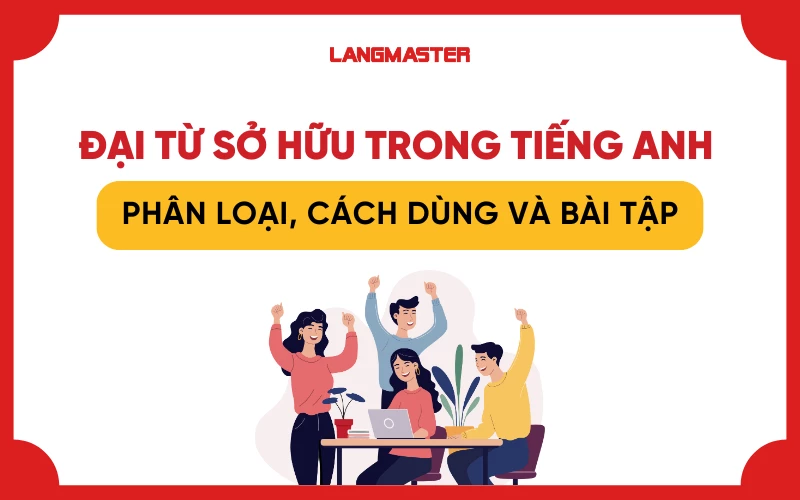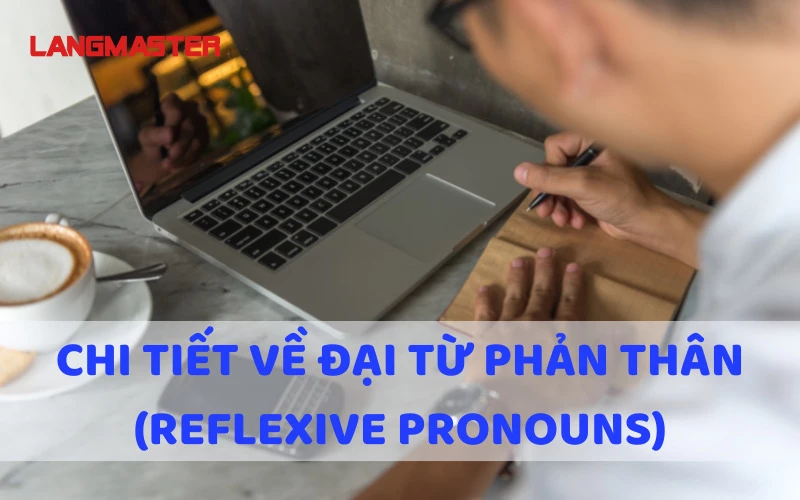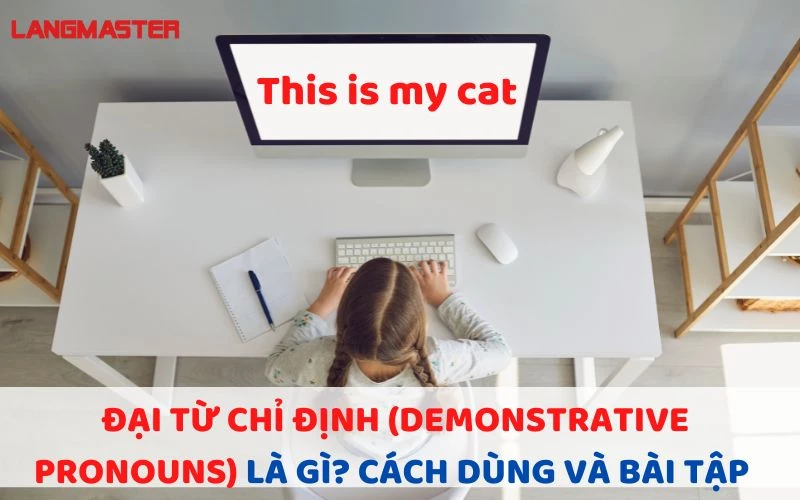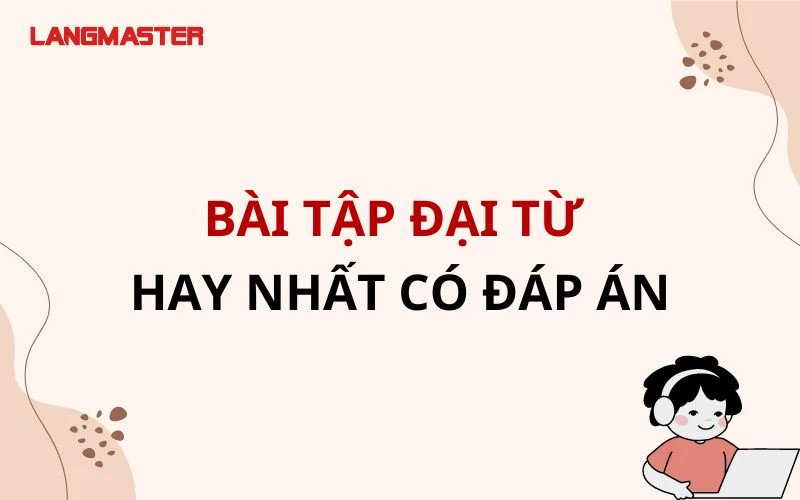Tiếng anh giao tiếp online
TỔNG HỢP BÀI TẬP ĐẠI TỪ TÂN NGỮ CÓ ĐÁP ÁN HAY & ĐẦY ĐỦ NHẤT
Mục lục [Ẩn]
- 1. Ôn tập kiến thức về đại từ tân ngữ (Object pronoun)
- 1.1. Đại từ tân ngữ là gì?
- 1.2. Vị trí và chức năng của đại từ tân ngữ
- 1.3. Cách dùng đại từ tân ngữ trong tiếng Anh
- 2. Bài tập về đại từ tân ngữ trong tiếng Anh có đáp án
- 2.1 Bài tập đại từ tân ngữ thông dụng nhất
- 2.2. Bài tập trắc nghiệm về đại từ tân ngữ
- 2.3. Bài tập đại từ tân ngữ nâng cao
- Kết luận
Đại từ tân ngữ (Object pronoun) là một trong những chủ điểm ngữ pháp cơ bản và quan trọng trong tiếng Anh. Vậy bạn đã thực sự nắm vững kiến thức về đại từ tân ngữ? Hãy cùng tiếng Anh giao tiếp Langmaster thực hành các bài tập đại từ tân ngữ trong tiếng Anh có đáp án hay và đầy đủ nhất để ôn tập nhé!
1. Ôn tập kiến thức về đại từ tân ngữ (Object pronoun)
1.1. Đại từ tân ngữ là gì?
Đại từ tân ngữ (object pronoun) chỉ người hoặc vật chịu tác động của một hành động nào đó và thay thế cho các danh từ/cụm danh từ đóng vai trò tân ngữ trong câu. Đại từ tân ngữ số ít gồm có me, you, him, her, it. Đại từ tân ngữ số nhiều gồm us, you và them, cụ thể:
|
Số ít |
Số nhiều |
|||
|
Đại từ chủ ngữ (Subject Pronoun) |
Đại từ tân ngữ (Object Pronoun) |
Đại từ chủ ngữ (Subject Pronoun) |
Đại từ tân ngữ (Object Pronoun) |
|
|
Ngôi 1 |
I |
me |
we |
us |
|
Ngôi 2 |
you |
you |
you |
you |
|
Ngôi 3 |
He/ She/ It |
Him/ Her/ It |
they |
them |
Ví dụ:
- Sam is my best friend. I trust her. (Sam là bạn thân của tôi. Tôi tin tưởng cô ấy.) ➜ “Her” thay thế cho “Sam”.
- I need to find my laptop. Where did you put it? (Tôi cần tìm chiếc laptop của tôi. Bạn đã để nó ở đâu?) ➜ “It” thay thế cho “my laptop”.
Xem thêm:
=> ĐẠI TỪ LÀ GÌ? TRỌN BỘ KIẾN THỨC VỀ ĐẠI TỪ TRONG TIẾNG ANH
=> TÂN NGỮ TRONG TIẾNG ANH: PHÂN BIỆT, CÁCH DÙNG VÀ BÀI TẬP THỰC HÀNH
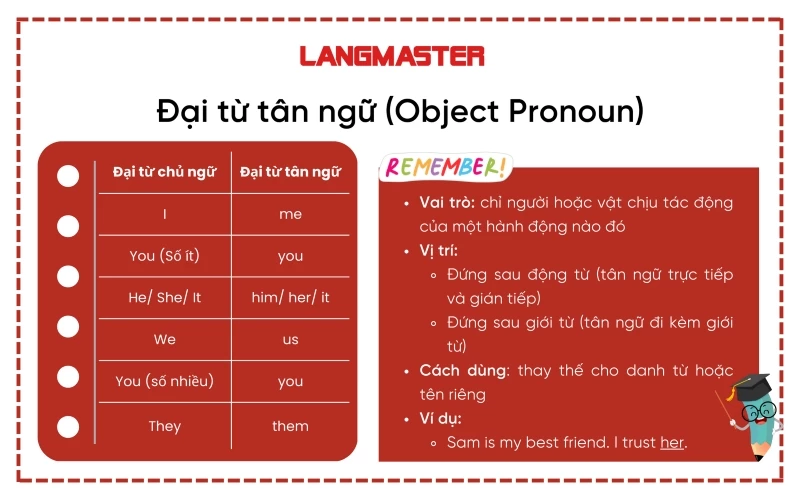
Kiến thức về đại từ tân ngữ trong tiếng Anh
1.2. Vị trí và chức năng của đại từ tân ngữ
Đại từ tân ngữ có thể thay thế các tân ngữ trong tiếng Anh: tân ngữ trực tiếp, tân ngữ gián tiếp và tân ngữ của giới từ.
1.2.1. Tân ngữ trực tiếp (Direct object)
Tân ngữ trực tiếp thường đứng ngay sau động từ, chỉ người hoặc vật chịu tác động trực tiếp của động từ.
Ví dụ:
- The dog is named Maggie. John feeds it every day. (Chú chó tên là Maggie. John cho nó ăn mỗi ngày.) ➜ “It” thay thế cho “The dog”, đứng sau động từ “feed”.
1.2.2. Tân ngữ gián tiếp (Indirect object)
Tân ngữ gián tiếp không phải là người hoặc vật chịu tác động trực tiếp của động từ. Khi đóng vai trò là tân ngữ gián tiếp, nó thường đứng trước tân ngữ trực tiếp và sau động từ.
Ví dụ:
- Rebbeca sent me the letter yesterday.
Trong ví dụ trên, tân ngữ trực tiếp là “the keys” (vật được đưa cho người nhận), tân ngữ gián tiếp là “me” (người nhận chìa khóa).
1.2.3. Đại từ tân ngữ của giới từ (Object of a preposition)
Tân ngữ của giới từ là người hoặc vật mà giới từ muốn chỉ tới, đứng sau giới từ như for, at, in, with, to,...
Ví dụ:
- Anna made this special gift only for him. (Anna làm món quà đặc biệt này chỉ dành cho anh ấy.)
- Hey, do you want to practice speaking English with us? (Này, bạn có muốn luyện nói tiếng Anh với chúng tôi không?)
1.3. Cách dùng đại từ tân ngữ trong tiếng Anh
Đại từ tân ngữ được dùng để thay thế cho danh từ hoặc tên riêng khi chúng ta muốn tránh lặp từ, giúp trình bày ngắn gọn và súc tích hơn.
Ví dụ:
- The “Exhuma” movie is very interesting. Do you want to watch it? (Phim “Quật mộ trùng ma” rất thú vị. Bạn có muốn xem nó không?) ➜ “It” thay thế cho “This movie” để tránh lặp từ.
Xem thêm:
=> BÀI TẬP ĐẠI TỪ HAY NHẤT CÓ ĐÁP ÁN
=> ĐẠI TỪ NGHI VẤN (INTERROGATIVE PRONOUNS): CÁCH DÙNG VÀ BÀI TẬP CÓ ĐÁP ÁN
2. Bài tập về đại từ tân ngữ trong tiếng Anh có đáp án
2.1 Bài tập đại từ tân ngữ thông dụng nhất
Bài tập 1. Điền đại từ tân ngữ thích hợp vào chỗ trống.
- The little girl is crying continuously. Do you know ______?
- Alexandra bought ______ a new car. He can drive to school instead of riding a motorbike.
- You look so terrible. Can I help ______?
- My new neighbors are very friendly and kind. I really like ______.
- Mrs. Salim is busy right now. Could you please call ______ after 2 hours?
- We gave him a lot of money, and he sold ______ this big house.
- My friends with original ideas always surprise ______.
- We met John at last night's party and had many exciting conversations with ______.
- Long gives ______ lots of strawberries when we visit ______.
- You are quite hot-tempered so Sandra doesn’t want to tell ______ the truth.
Đáp án:
- her
- him
- you
- them
- her
- us
- me
- him
- us - him
- you
Bài tập 2. Viết lại các câu sau với đại từ tân ngữ thích hợp.
- I enjoy listening to the newly released song when studying.
- I will pick Rosie and her friends up at 8 a.m.
- My father usually reads magazines after breakfast.
- It’s not difficult to memorize new vocabulary words if you are hard-working.
- Ricky gave my friends and me some advice.
- She ate breakfast quickly and took a taxi to the airport.
- Put the novels on the top shelf.
- After finishing a half marathon, we gave Tom a break because he was exhausted.
- I can’t wear this dress to a formal party.
- Where do you want to store these eggs?
Đáp án:
- it
- them
- it
- them
- us
- it
- them
- him
- it
- them
Bài tập 3. Điền đại từ tân ngữ thích hợp vào chỗ trống.
- He doesn’t tell ______ (I) anything about this project.
- They never send ______ (he) anything because they don’t know this address.
- You can turn the radio off if you don’t want to hear ______ (the radio).
- All the the waiters sing “Happy Birthday” to ______ (you).
- He wrote ______ (his girlfriend) a love poem.
- I always do handmade cards for ______ (my friends and family) on special days.
- Romeo sends ______ (Juliet) roses on Valentine’s Day.
- We are in the classroom, but Tony isn’t with ______ (we).
- Am I your family: tell ______ (I) the problem.
- The cake’s in the fridge. Don’t eat ______ (the cake).
Đáp án:
- me
- him
- it
- you
- her
- them
- her
- us
- me
- it
Bài tập 4. Thay đổi các danh từ/ cụm danh từ được gạch chân bằng đại từ tân ngữ phù hợp.
- John bought a chihuahua at the store. ➜ John bought ______ at the store.
- Riccardo and Mary really love their children. ➜ Riccardo and Mary really love ______.
- We can’t take this difficult situation anymore. ➜ We can’t take ______ anymore.
- Bob read the “To Kill a Mockingbird” book in one day. ➜ Bob read ______ in one day.
- Rihanna is going to enjoy her vacation with her parents. ➜ Rihanna is going to enjoy her vacation with ______.
- My father drinks coffee in the morning. ➜ My father drinks ______ in the morning.
- Mr. Benjamin contacted my boss yesterday. ➜ Mr. Benjamin contacted ______ yesterday.
- The professor called on Sunhee and Hannad. ➜ The professor called on ______.
- I put my sandwich on the table. ➜ I put ______ on the table.
- Can I bring your book, Joe? ➜ Can I bring ______, Joe?
Đáp án:
- it
- them
- it
- it
- them
- it
- him/ her
- them
- it
- it
Bài tập 5. Chọn đại từ tân ngữ thích hợp dưới đây để hoàn thành câu.
|
it |
him |
her |
|
them |
you |
us |
- Is he marrying Olivia? - Yes, he is in love with ______.
- Your little son is making a lot of noise! - I’ll ask ______ to be quiet.
- Please will you ask Tung to come in? - Sorry, I don’t know ______.
- Do you know where my sunglasses are? - You are wearing ______.
- Why is he always talking about Jennie? - He obviously likes ______.
- What is the title of the article winning this prize? - I’m afraid I can’t remember ______.
- Take the babies to bed, John. Don’t let ______ watch this movie with ______.
- You and Leo are very tall, but Casa is taller than ______.
- Sarah is out of the office now. Can you remind ______ to call ______ later?
- The book you lent ______ was fascinating; thank you for recommending ______.
Đáp án:
- her
- him
- him
- them
- her
- it
- them - us/you
- you
- me
- me - it
>> ĐĂNG KÝ CÁC KHOÁ HỌC TIẾNG ANH
- Khóa học tiếng Anh giao tiếp TRỰC TUYẾN 1 kèm 1
- Khóa học tiếng Anh giao tiếp dành riêng cho người đi làm
- Khóa học tiếng Anh giao tiếp TRỰC TUYẾN NHÓM
- Test trình độ tiếng Anh miễn phí
- Đăng ký nhận tài liệu tiếng Anh
2.2. Bài tập trắc nghiệm về đại từ tân ngữ
Bài tập 6. Chọn đáp án đúng trong các đáp án A,B,C,D để hoàn thành câu.
1. I have a problem with Object Pronouns homework. Could you please help ______?
A. him B. I C. it D. me
2. My friends and I are going to watch Descapable 4. Would you like to join ______?
A. us B. we C. them D. they
3. Should I give this book to ______ or to Mr.Smith?
A. she B. you C. he D. they
4. I like talking with ______ because they are always telling funny stories.
A. they B. their C. you D. them
5. Please don’t ask ______ about direct and indirect objects. I haven’t learned about ______.
A. me - them B. me - they C. I - they D. me - they.
6. These cups are clean. Should I put ______ on the table?
A. they B. them C. him D. her
7. That dog bit ______ last week.
A. I B. they C. me D. we
8. I tried to call ______ this morning, but no one answered the phone.
A. her B. it C. she D. they
9. If you see Ms. Van tomorrow, please ask ______ about the homework.
A. she B. her C. you D. they
10. When the children cross the road, watch ______ carefully.
A. them B. they C. you D. it
Đáp án:
1. D
2. A
3. B
4. D
5. A
6. B
7. C
8. A
9. B
10. B
Bài tập 7. Chọn đáp án đúng trong các đáp án A,B,C,D để hoàn thành câu.
1. Give your parent my best regards when you see ______.
A. they B. them C. us D. we
2. ______ met Sammy at the mall yesterday.
A. Us B. Them C. We D. Her
3. Can you take this letter and give ______ to Aron?
A. it B. them C. us D. her
4. I will tell ______ that you send the wrong email, so don’t worry.
A. he B. him C. his D. it
5. My father takes ______ to my grandmother’s house.
A. we B. they C. us D. she
6. My I borrow this novel? I will return ______ the day after tomorrow.
A. it B. they C. them D. her
7. Let ______ know when you make the decision.
A. me B. I C. they D. we
8. Raynold told ______ that he’s going to Vietnam tomorrow.
A. we B. they C. us D. she
9. Billy is cooking dinner for ______.
A. we B. they C. us D. she
10. We are late for school, hurry up or ______ will miss ______.
A. us - it B. we - it C. they - it D. them - it
Đáp án:
1. B
2. C
3. A
4. B
5. C
6. A
7. A
8. C
9. C
10. B
2.3. Bài tập đại từ tân ngữ nâng cao
Bài tập 8. Gạch chân lỗi sai trong các câu sau và viết lại câu đúng. Câu có thể có nhiều hơn 1 lỗi sai.
- My friend Lisa lives in Korea. This is a parcel from she.
- Sorry, I can’t tell he what happened with his cat.
- All the children are hungry after playing sports. Give they some food.
- Jack and Rosie are in the garden. Bring he they football.
- Paul and Thomas can’t do their grammar exercises. Can you help us?
- These clothes and books are for poor children. Can you take it to the Red Cross in the city?
- This cake is made for Carol and Jackson. Please give it to they.
- I haven’t seen my grandparents for a long time; therefore, I’m going to visit he tomorrow.
- What’s Linh’s telephone number? I have to update her about the project but I don’t know its.
- Why are you staring at I?
Đáp án:
- My friend Lisa lives in Korea. This is a parcel from she.
➜ My friend Lisa lives in Korea. This is a parcel from her.
- Sorry, I can’t tell he what happened with his cat.
➜ Sorry, I can’t tell him what happened with his cat.
- All the children are hungry after playing sports. Give they some food.
➜ All the children are hungry after playing sports. Give them some food.
- Jack and Rosie are in the garden. Bring he they football.
➜ Jack and Rosie are in the garden. Bring them their football.
- Paul and Thomas can’t do their grammar exercises. Can you help us?
➜ Paul and Thomas can’t do their grammar exercises. Can you help them?
- These clothes and books are for poor children. Can you take it to the Red Cross in the city?
➜ These clothes and books are for poor children. Can you take them to the Red Cross in the city?
- This cake is made for Carol and Jackson. Please give it to they.
➜ This cake is made for Carol and Jackson. Please give it to them.
- I haven’t seen my grandparents for a long time; therefore, I’m going to visit him tomorrow.
➜ I haven’t seen my grandparents for a long time; therefore, I’m going to visit them tomorrow.
- What’s Linh’s telephone number? I have to update her about the project but I don’t know its.
➜ What’s Linh’s telephone number? I have to update her about the project but I don’t know it.
- Why are you staring at I?
➜ Why are you staring at me?
Kết luận
Như vậy bạn đã ôn tập lý thuyết và thực hành các bài tập về đại từ tân ngữ trong tiếng Anh. Hi vọng với những dạng bài đa dạng kèm đáp án phía trên, bạn đã nắm vững kiến thức về đại từ tân ngữ. Đừng quên tham khảo các khóa học tại tiếng Anh giao tiếp Langmaster để “nâng trình” kỹ năng nói, áp dụng ngữ pháp vào đối thoại chính xác ngay hôm nay.
Nội Dung Hot
KHÓA TIẾNG ANH GIAO TIẾP 1 KÈM 1
- Học và trao đổi trực tiếp 1 thầy 1 trò.
- Giao tiếp liên tục, sửa lỗi kịp thời, bù đắp lỗ hổng ngay lập tức.
- Lộ trình học được thiết kế riêng cho từng học viên.
- Dựa trên mục tiêu, đặc thù từng ngành việc của học viên.
- Học mọi lúc mọi nơi, thời gian linh hoạt.
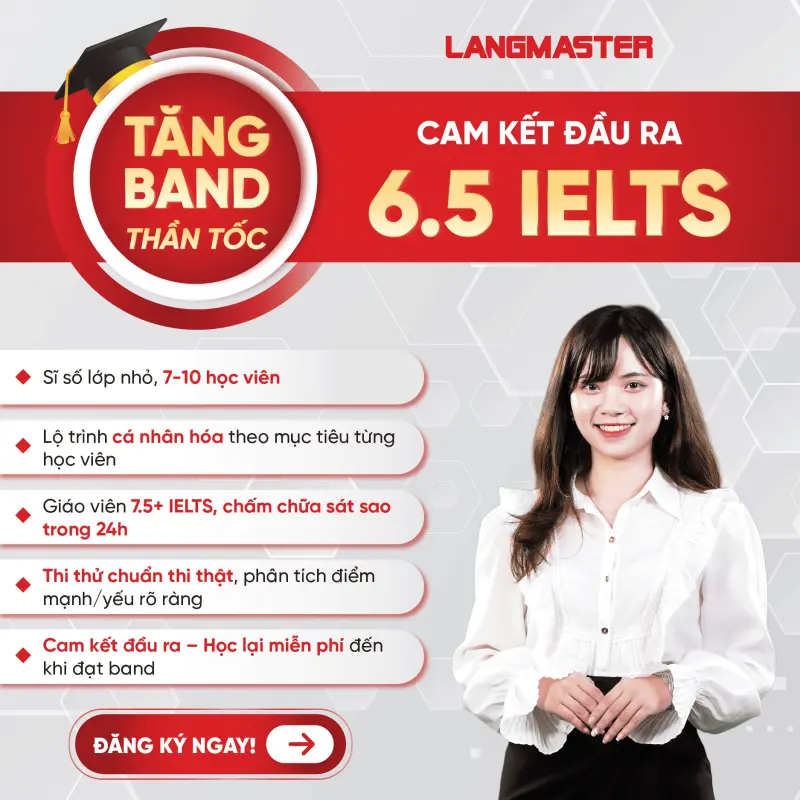
KHÓA HỌC IELTS ONLINE
- Sĩ số lớp nhỏ (7-10 học viên), đảm bảo học viên được quan tâm đồng đều, sát sao.
- Giáo viên 7.5+ IELTS, chấm chữa bài trong vòng 24h.
- Lộ trình cá nhân hóa, coaching 1-1 cùng chuyên gia.
- Thi thử chuẩn thi thật, phân tích điểm mạnh - yếu rõ ràng.
- Cam kết đầu ra, học lại miễn phí.

KHÓA TIẾNG ANH TRẺ EM
- Giáo trình Cambridge kết hợp với Sách giáo khoa của Bộ GD&ĐT hiện hành
- 100% giáo viên đạt chứng chỉ quốc tế IELTS 7.0+/TOEIC 900+
- X3 hiệu quả với các Phương pháp giảng dạy hiện đại
- Lộ trình học cá nhân hóa, con được quan tâm sát sao và phát triển toàn diện 4 kỹ năng
Bài viết khác
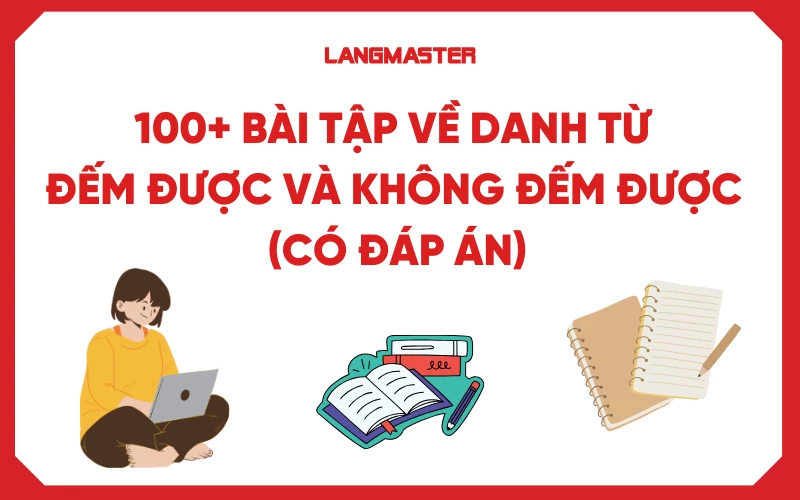
100+ Bài tập danh từ đếm được và không đếm được có đáp án giúp bạn rèn luyện ngữ pháp tiếng Anh hiệu quả. Tổng hợp đầy đủ bài tập từ cơ bản đến nâng cao!

Familiar đi với 2 giới từ là to và with. Cấu trúc: Familiar to + somebody, familiar with + somebody/something. Ví dụ: He is familiar with the rules of the game.
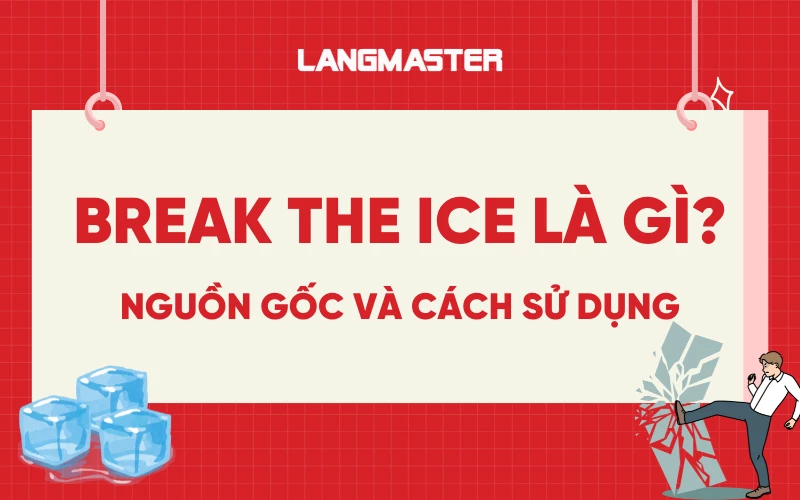
Break the Ice là một thành ngữ tiếng Anh phổ biến, thường được sử dụng trong các tình huống giao tiếp khi gặp gỡ người mới, tham gia sự kiện hoặc mở đầu một cuộc thảo luận.
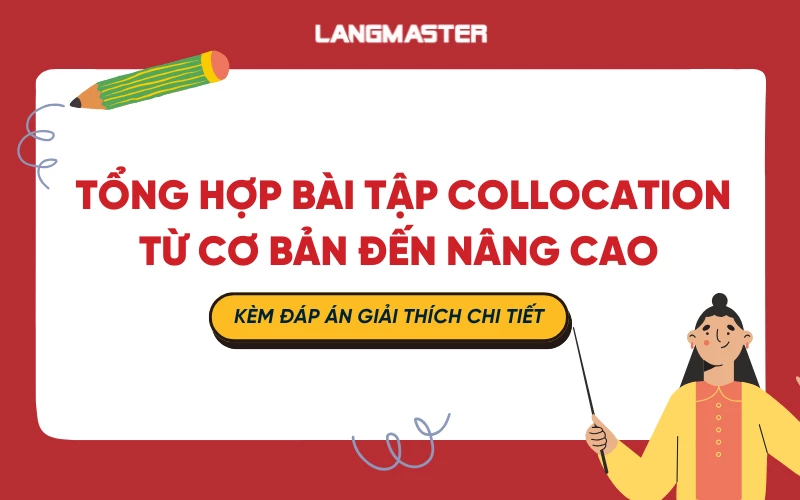
Tất cả bài tập Collocation: Tổng bài tập collocation thi THPT Quốc Gia với các dạng bài từ cơ bản đến nâng cao, bài tập collocation lớp 9 kèm đáp án chi tiết nhất
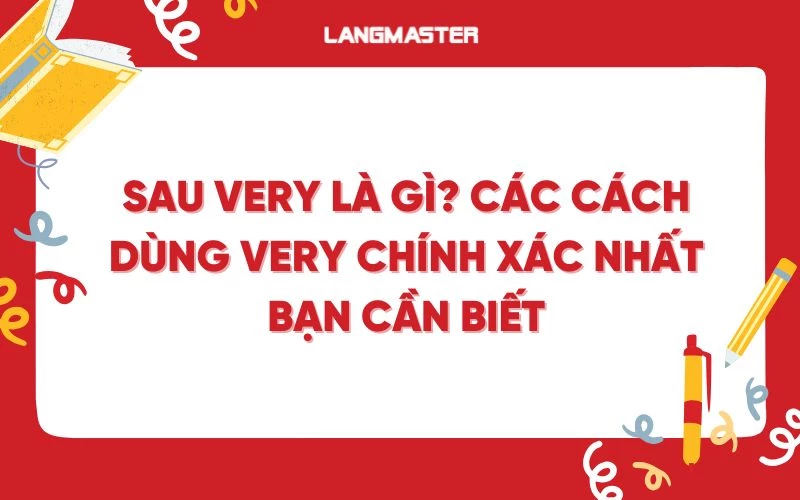
Sau “very” là gì? Very là một từ tiếng Anh quen thuộc có thể đóng vai trò là tính từ hoặc trạng từ để nhấn mạnh, bổ sung mức độ tùy ngữ cảnh, tình huống sử dụng.







